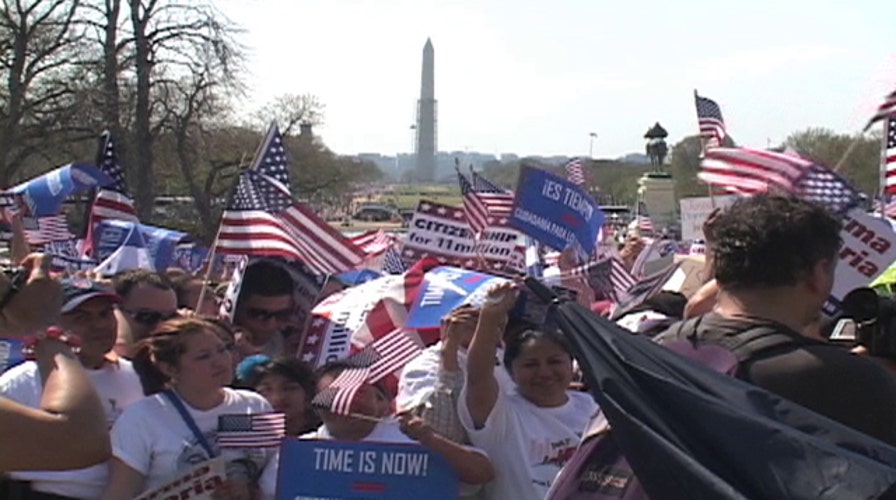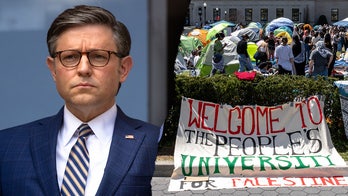Senators introduced a long-awaited and sweeping immigration overhaul early Wednesday morning, touching off what is likely to be a charged debate over whether the legislation amounts to "amnesty" for those who broke the rules and does enough to help those who follow them.
Sen. Charles Schumer, D-N.Y., appeared on the Senate floor around 2 a.m. Wednesday to file the 844-page bill. It is the product of weeks of negotiations among the Senate's "Gang of Eight," a bipartisan group that includes Schumer and seven others.
"This bill marks the beginning of an important debate," Sen. Marco Rubio, R-Fla., said. "And I believe it will fix our broken system by securing our borders, improving interior enforcement, modernizing our legal immigration to help create jobs and protect American workers, and dealing with our undocumented population in a tough but humane way that is fair to those trying to come here the right way and linked to achieving several security triggers."
Rubio is arguably the most vital of the eight co-authors, as his support has the potential to attract fellow conservatives. He and others in the "gang" are making a hard-charging effort to ease conservative concerns, pointing out that the bill includes language to both boost border security while putting limits on the so-called path to citizenship.
The bill, as expected, includes a carefully calibrated trade-off where millions of illegal immigrants would be put on a pathway to legal status in exchange for paying fines, provided certain border security steps are taken.
Arguably the biggest hurdle to passage will be convincing conservatives that the flow of illegal immigration will be stemmed -- and not increased -- by the legislation.
The bill, as introduced, would require the Homeland Security Department to create and launch plans for border security and fencing before illegal immigrants can enter a provisional status. This could happen as early as six months after enactment of the bill.
They would remain in that provisional status for 10 years, able to work legally but barred from federal benefits like welfare or health care. After 10 years they could seek green cards conferring permanent legal status, provided certain goals for border apprehensions and other security measures are met.
After another three years, those immigrants could petition for citizenship.
In total, the bill creates a minimum 13-year path to citizenship for up to 11 million illegal immigrants, costing them each $2,000 in fines plus additional taxes. Applicants would have to meet other criteria as well in order to qualify.
It's unclear whether the border security "triggers" will be enough to satisfy skeptical lawmakers. Conservatives say border security improvements should be verified before illegal immigrants can seek citizenship. Illegal immigrant advocates say their pathway should not be held up by that process.
Regardless, the plan dedicates billions to security efforts, including $3 billion to providing more border agents, customs agents and surveillance systems along the border; and $1.5 billion to building up border fencing.
It also includes language meant to assuage concerns that the mass legalization would send millions onto the federal welfare rolls. The bill claims to strengthen a federal law requiring applicants for legal status to prove they won't become government dependents -- some Republicans have claimed this law is rarely enforced.
Sen. John McCain, R-Ariz., one of the authors in the bipartisan "Gang of Eight," said after meeting with President Obama Tuesday afternoon that the security provisions in the bill would assure "we won't have a third wave" of illegal immigration.
"It's not amnesty," he added, preemptively responding to criticism of the pathway to legal status.
Obama, after being briefed by McCain and Schumer, said the bill is "largely consistent with the principles that I have repeatedly laid out for comprehensive reform."
The authors, though, were confronting concerns about the bill's contents, even before its release. Rep. Lamar Smith, R-Texas, put out a statement claiming "it legalizes almost everyone in the country illegally before the border is secured."
"I don't think the American people are going to give the Senate another turn at bat," he said.
The statement drew a rebuke from Rubio's office.
"To have an honest debate, we need to be clear about the facts -- and unfortunately there's already some misinformation being spread about what's in the bill. Our legislation will implement the toughest border security and immigration law enforcement in U.S. history before a single illegal immigrant is able to apply for permanent residence in the U.S.," Rubio spokesman Alex Conant said.
The security and legalization efforts, though, are only part of the sweeping plan.
The legislation also would remake the nation's inefficient legal immigration system, creating new immigration opportunities for tens of thousands of high- and low-skilled workers, as well as a new "merit visa" aimed at bringing people with talents to the U.S. Senators had planned to formally introduce the bill Tuesday, but after Monday's bombing at the Boston Marathon a planned press event was delayed until later in the week.
Employers would face tough new requirements to check the legal status of all workers.
Overall, the changes represent the most dramatic overhaul to U.S. immigration law in more than a quarter-century.
The bill is the result of months of secretive negotiations among eight lawmakers. In addition to Schumer and McCain, they are Democrats Dick Durbin of Illinois, Robert Menendez of New Jersey and Michael Bennet of Colorado, working with Republicans Rubio of Florida, Lindsey Graham of South Carolina and Jeff Flake of Arizona.
Even harder work lies ahead now that legislative language will become public for other lawmakers and groups on all sides to examine and react to. The Senate Judiciary Committee will hold hearings on the bill beginning Friday and likely move to amend and vote on it in May, with action on the Senate floor expected later in the summer. The Republican-controlled House also must act, and opposition from some conservatives there is likely to be fierce.
People brought here illegally as youths would have a faster path: They could get green cards in five years and would become eligible for citizenship immediately thereafter.
U.S. citizens no longer would be able to sponsor their siblings for eventual U.S. citizenship, a change activist groups have opposed. That's among several changes aimed at rebalancing an immigration system that now awards around 15 percent of green cards to people with employment ties, and the majority to people with family ties, to a system that awards 45 percent to 50 percent of green cards based on employment ties.
There would be no limit in the number of green cards awarded to people of extraordinary ability in science, arts, education, business or athletics, or to outstanding professors, doctors and others. A new startup visa would be created for foreign entrepreneurs trying to come here to start their own companies.
Visas for highly skilled workers greatly in demand by technology companies would nearly double. Low-skilled workers would be able to come in for jobs in construction, long-term care and other industries, ultimately up to 200,000 a year. A new agriculture visa program would bring farm workers to the U.S.; farm workers already here illegally would get a faster path to citizenship than others here illegally, able to seek a green card in five years, an effort to create a stable agricultural workforce.
The bill is titled the "Border Security, Economic Opportunity and Immigration Modernization Act of 2013."
The Associated Press contributed to this report.





